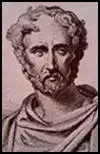Pliny the Elder

Pliny the Elder was born at Rhaetia in AD 23. He held several government posts including commander of the Misenum Fleet. He adopted Pliny the Younger, who later became Governor of Bithynia.
Pliny wrote books on a variety of subjects. His most famous book, Natural History, deals with the scientific, social, political and economic aspects of the Roman Empire. Pliny mainly relied on secondary sources (he claimed to have a library of 2,000 books). His work is often criticised for including too many factual inaccuracies.
Pliny the Elder died during the eruption of Mount Vesuvius in AD 79 when Pompeii and Herculaneum were destroyed.
Primary Sources
(1) Pliny the Elder was commander of the Misenum naval base and died while trying to rescue people living in the Bay of Naples during the eruption of Mount Vesuvius in AD 79. Afterwards, Tacitus, the Roman historian, wrote to the nephew of Pliny the Elder and asked him what had happened. In his reply, Pliny the Younger described the eruption.
It was not clear at that distance from which mountain the cloud was rising (it was afterwards known to be Vesuvius)... In places it looked white, elsewhere blotched and dirty, according to the amount of soil and ashes it carried with it... My uncle ordered a boat to be made ready, telling me I could come with him if I wished. I replied that I preferred to go on with my studies...
As he (Pliny the Elder) was leaving the house he was handed a message from Rectina, wife of Cascus, whose house was at the foot of the mountain... She was terrified by the danger threatening her and implored him to rescue her from her fate... He gave orders for the warships to be launched and went on board himself with the intention of bringing help to many more people besides Rectina, for this lovely stretch of coast was thickly populated.
He hurried to the place which everyone else was hastily leaving, steering his course straight for the danger zone... Ashes were already falling, hotter and thicker as the ships drew near, followed by bits of pumice and blackened stones, charred and cracked by the flames: then suddenly they were in shallow water, and the shore was blocked by the debris from the mountain... but he was able to bring the ship in (at Stabiae). He embraced Pomponianus, his terrified friend, cheered and encouraged him, and thinking he could calm his fears by showing his own composure, gave orders that he was to be carried to the bathroom. After his bath he dined...
Meanwhile on Mount Vesuvius broad sheets of fire and leaping flames blazed at several points, their bright glare emphasised by the darkness of night. My uncle tried to allay the fears of his companions by repeatedly declaring that these were nothing but bonfires left by the peasants in their terror, or else empty houses on fire in the districts they had abandoned.
Then he went to rest and certainly slept, for as he was a stout man his breathing was rather loud and heavy and could be heard by people coming and going outside his door. By this time the courtyard giving access to his room was full of ashes mixed with pumice-stones, so that its level had risen, and if he had stayed in the room any longer he would never have got out... They debated whether to stay indoors or take their chance in the open, for the buildings were now shaking with violent shocks, and seemed to be swaying to and fro as if they were torn from the foundations. Outside, on the other hand, there was the danger of falling pumice-stones... after comparing the risks they chose the latter... As a protection against falling objects they put pillows on their heads tied down with cloths.
Elsewhere there was daylight by this time, but they were still in darkness, blacker and denser than any ordinary night, which they relieved by lighting torches and various kinds of lamps. My uncle decided to go down to the shore and investigate the possibility of any escape by sea, but he found the waves still wild and dangerous... Then the flames and smell of sulphur which gave warning of the approaching fire drove the others to take flight and roused him to stand up. He stood leaning on two slaves and then suddenly collapsed, I imagine because the dense fumes choked his breathing...
When daylight returned on the 26th - two days after the last day he had been seen - his body was found intact and uninjured, still fully clothed and looking more like sleep than death.
(2) Pliny the Elder, Natural History (c. AD 75)
All previous aqueducts have been completely outclassed by the lavish schemes begun by the Emperor Caligula... 350 million sesterces were expended on this project. If we take careful account of all the abundant supply of water for public buildings, baths, settling-tanks, pools, private mansions, gardens, and country estates close to the city, and the distance the water travels before entering the city, the height of the arches, the tunnelling of mountains, the levelling of routes across deep valleys, one must rate all this as the most remarkable achievement anywhere in the world.
